So, you’ve been using your air conditioner for quite a while, and so far, the results have been fantastic. You’ve been staying cool, breathing cleaner air, and doing it all for a reasonable cost. However, you’ve recently noticed something that concerns you. Your air conditioner is leaking, and you aren’t sure what that means. Should you ignore it, or should you panic? What needs to be done, and how should you do it? These are all important questions that must be answered, but you shouldn’t panic. We’re here to help you understand what a leaking air conditioner could mean, and show you how you can be proactive about dealing with it.
The first thing you’ll want to do when you notice your air conditioner leaking is find out why. This is a good-news-bad-news scenario: the bad news is that there is a host of reasons why your air conditioner could be leaking. The good news is that each potential cause can be remedied, either alone or with qualified professional help. In fact, once you’ve discovered the source of your leak, a large part of your work will already be finished.
Common Reasons Why Your Air Conditioner Could be Leaking
 Sometimes, an air conditioner leak isn’t a leak at all. In fact, many people who think they are facing a leaky air conditioner are only noticing the effects of high condensation. Condensation is usually the result of high outside temperatures or incorrect thermostat settings. Either scenario will cause your condenser to work hard, resulting in excess condensation and a pool of water near your indoor unit.
Sometimes, an air conditioner leak isn’t a leak at all. In fact, many people who think they are facing a leaky air conditioner are only noticing the effects of high condensation. Condensation is usually the result of high outside temperatures or incorrect thermostat settings. Either scenario will cause your condenser to work hard, resulting in excess condensation and a pool of water near your indoor unit.
There are plenty of cases where a leak turns out to be legitimate. Below are some of the most common, and some tips on how to identify them:
- Bad Installation:
Poor installation often results in leaking air conditioners. If there is too much pressure in the system or it is not installed to be perfectly level, leaks are likely to occur. A professional HVAC technician will be able to check your system to see if it is level or if excess pressure has manifested.
- A Broken Pump:
A broken pump is unable to move water through your condensate drain and out of your home. To check, pour some water into the pan and see if it is pumped out. If it is not (and the pump has power), then call a professional who will be able to repair it.
- Condensate Drain Problems:
Your pump may not be the problem. It could simply be that there is a blockage in your condensate drain that is causing water to back up and overflow. If the obstruction is near the opening, just remove it and see if the problem discontinues. If it is further inside the line, you may use a wet-dry vacuum or call a service technician that has specialized equipment for such problems.
- Deficient Seals:
If the seals on your air conditioner are loose or improperly fitted, they allow a higher-than-usual amount of warm air to enter the system. Warm air holds considerably more moisture than cool air, so as the warm air moves through the system this moisture becomes water and pools beneath the unit. Bad seals also cause your unit to be less efficient. If you know how you can find and tighten seals by yourself, but most technicians will be able to do this faster and more reliably.
- Dirty Filters:
Filters are the unsung heroes of your air conditioner. They make sure the air that enters your system is clean, by screening out debris. However, when the filters become dirty and clogged, less air can enter the system and make its way to the evaporator coil. As a result, your evaporator coil will freeze, and begin to produce ice. That ice will eventually melt, but when it does, it will lead to more water than your drain pan can handle. The result will be water overflowing.
Filters are easy enough to replace and should be changed out on a monthly basis when your unit is in use. However, an evaporator coil is much harder to replace, and should only be handled by a professional. The same applies to many of the possible reasons why your air conditioner is leaking. Be sure that you can correctly identify leaks in areas you can improve by yourself, and that you have a licensed HVAC technician on call in case the leak is coming from somewhere more complicated.
Knowledge is power when dealing with an air conditioner that is leaking. When you know where the leak is coming from, you can take the appropriate steps to correct it. A blocked condensate drain or dirty filter can easily be handled by yourself in most cases, but other leaks demand professional attention. Use your best judgment, and consider regular service calls to keep your system working so that leaks are less likely.
